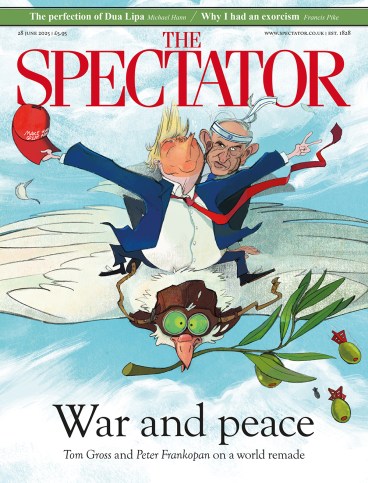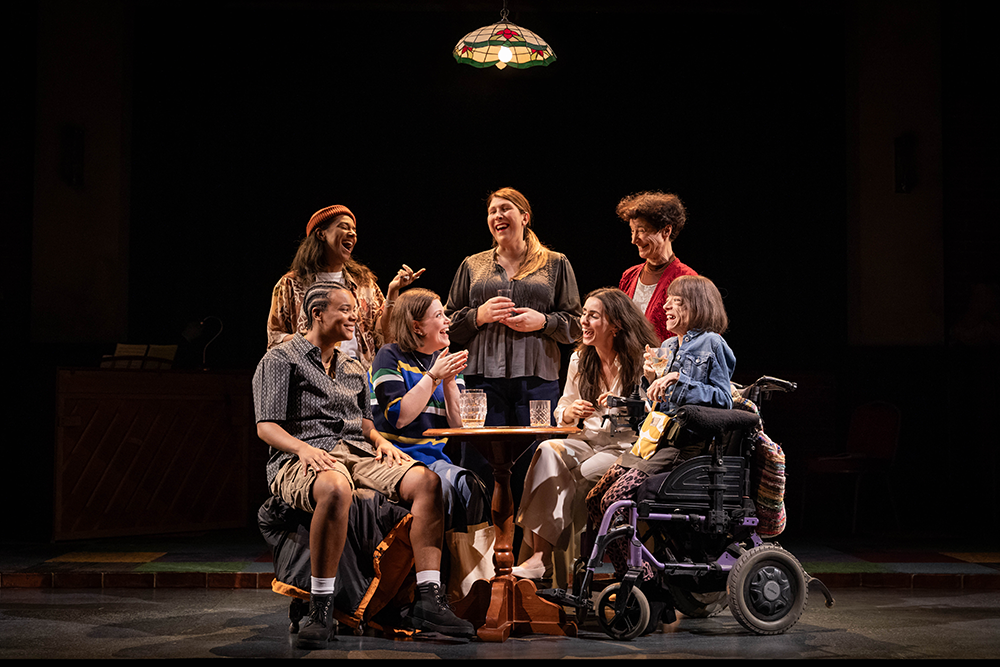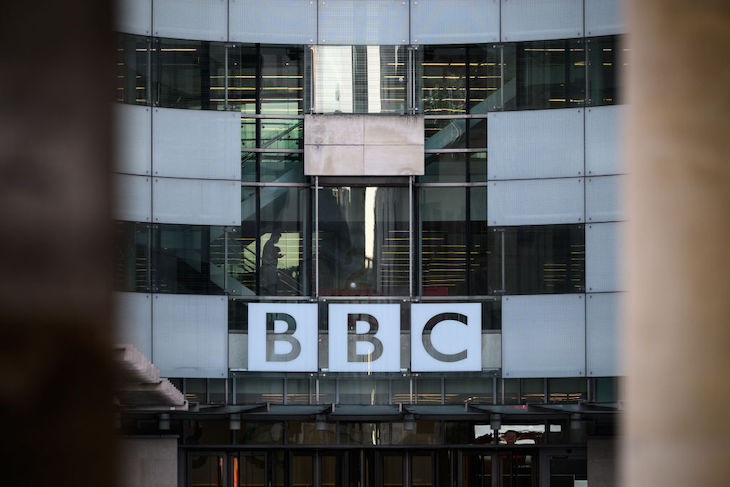
The Ministry of Lesbian Affairs is a comedy that feels as sweet and comforting as a knickerbocker glory. The show is set in a leaky scout hut where a bunch of lesbians meet to perform choral music. The conductor, Connie, has the bluff, good-natured energy of an RAF squadron leader. ‘Snippety-snap,’ she calls as she encourages the ‘ladies’ to warm up. Correct pronoun usage doesn’t interest her. Nor does non-binary language. She’s an OWL (older wiser lesbian) and she runs the choir like a drop-in centre for strays, fugitives and sexual rejects in need of a substitute family.
The newest arrival, Dina, is a Qatari princess who lives in a luxury apartment with her controlling brute of a husband. Dina catches the eye of Ellie, the choir’s in-house seductress, but Connie puts a stop to their flirtation. ‘Try not to sleep with any new members,’ she tells Ellie. ‘They’re too scared to come back.’
When Lori arrives with her long-term girlfriend, Ana, the tensions in their relationship spill out into the open. Lori is a closeted lesbian who hates to be seen hugging Ana in public. Ana, meanwhile, is about to leave London in search of a new job because she works for a racist university. ‘They’re understandably embarrassed at having an all-white post-colonial literature department.’
In Act Two, the choir perform at a Pride festival where Dina sports a T-shirt that defines a lesbian as ‘a woman who loves a woman’. Some in the crowd take exception to this bland statement and the choir’s performance is cut short. Public accusations of transphobia are made worse when followers of Mumsnet join in the controversy. ‘They’re expressing solidarity with us!’ says Fi, in horror. (The script is full of double-edged gags like this.) The women find solutions to their problems and the show ends on a happy upbeat note. Even the conflict over trans rights is resolved with smiles all round.
The production by Hannah Hauer-King looks and feels terrific. There are great performances from Serena Manteghi as the innocently beautiful Dina and from Shuna Snow as Connie, the inspirational leader. She wields her baton like a clown mimicking a pretentious maestro conducting the Berlin Philharmonic. A beautiful piece of physical comedy. What’s refreshing about this production is that each character qualifies as a ‘victim’ on paper. If you want a tick-box show, here it is. Ellie and Lori are black lesbians, Fi uses a wheelchair, Bridge is a trans woman, and Ana is on the run from racist bigots. And yet the show makes no special appeal to the supporters of each cause. Like the best comedy, it just wants to be amusing, open and humane. It gives everyone what everyone needs: a sense of common ground.
Cruel Britannia opens with a contrite announcement made by an unnamed Australian voiceover. He solemnly expresses his remorse for the expropriation of lands from the aboriginal peoples without their consent. An odd start for a play staged in a basement near Waterloo.
Like the best comedy, it just wants to be amusing, open and humane
Then a shift of tone. A figure appears in a spangly jacket, a lacy black skirt and a pair of shiny DMs with mismatched laces – purple and orange. The figure is male and his tanned body is copiously adorned with tattoos. He tells a story set in the 1980s about two friends named Frank and Harry. Both are Millwall supporters and they enjoy travelling the country fighting with rival hooligans. The location flits all over the place. Sometimes Frank is on a train bound for Manchester. Sometimes he’s in a Soho alleyway. Occasionally he enters his dead mother’s wardrobe where he wraps himself in a crimson party frock infused with her scent.
To complicate matters, Frank appears to be the main character as well as the narrator. There are cryptic references to the ‘ICF’ which will puzzle those who are unaware that hooligans in the 1980s gave themselves semi-official nicknames like ‘intercity firm’. Likewise, a ‘man who works for the coal board’ refers to a Thatcherite opponent of the miners’ strike of 1984-85. In the middle of this puzzling monologue, something happens to Harry. Murdered perhaps. Jail time is mentioned but the references are oblique.
Later, we learn that Frank is gay, which explains his penchant for alleyways in Soho. And Harry appears to be gay as well. Perhaps that’s the point here. From the late 1970s, football violence declined as society grew more tolerant of homosexuality. This show hints that the thugs who clashed outside football stadiums on Saturday afternoons were closeted gay males seeking a socially acceptable outlet for their passions.
The script would be of interest to social historians if the narrative were better orchestrated and signposted. But it can’t escape its riddling obscurity. The show has no idea what it wants to say or why. Take the opening apology to Australia. What’s that for? Lord knows.








Comments